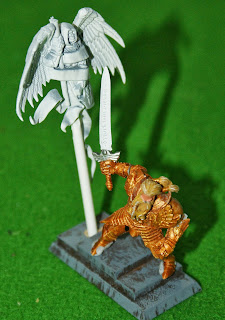Evolution of the Dark Elf Barque
The latest Druchii Army book makes a lot about the Maritime connection of the DE's. I find it sad that the Kharybdis is not a sea creature, I think it really should have that rule, seeing as that the original Carybdis is sea monster. Anyhow, I love the pirate aspect of the corsairs.
My workbench is littered with conversions and projects, many obtained at the swap meet.
Eldar Whyches to Sisters of Slaughter, conversion of several Avatars of war figures (Sorceress into Hag, Dreadlord w sword to Dreadlord with Hand Xbow, several suitable Reaper (and other) figures into my DE Livery. On the left Warmachine Town Guard being recruited for the Empire City of Talabheim... I like their beefier look.
Anyhow, I have been thinking about building a Druchii boat ever since Nick and I played a
Dark Elf attack on an Empire Settlement (clicky to see the post) scenario.
The fluff around the Druchii make a lot of the sea-borne raiding parties. The one thing that stopped me from building a Dark Ark was the size and materials needed (and the time to construct such a vessel) and the poor quality of some attempts I saw on the web.
At the KWC's swap day I came across the answer: James was selling some of his Dark Eldar bits, amongst this some derelict space vessels, and bits that could pass as sails!
I would build, not the not the large Dark ARK that deposits the main raiding force, but a smaller, more agile and easier to conceal vessel, the Druchii BARQUE
So, slowly but surely the Druchii Barque is now evolving...
Sails and rams
Space Hulk
Voila! The beginnings of a Druchii Barque
From Wiki:
"The word barque entered English via French, which in turn came from the Latin barca by way of Occitan, Spanish or Italian. The Latin barca may stem from Celtic "barc" (per Thurneysen) or Greek "baris" (per Diez), a term for an Egyptian boat. The Oxford English Dictionary however considers the latter improbable.
The word barc appears to have come from Celtic languages. The form adopted by English, perhaps from Irish, was bark, while that adopted by Latin as barca very early, which gave rise to the French barge and barque. In Latin, Spanish and Italian the term barca refers to a small boat, not a full-size ship. French influence in England led to the use in English of both words, although their meanings now are not the same.
Well before the 19th century a barge had become interpreted as a small vessel of coastal or inland waters. Somewhat later, a bark became a sailing vessel of a distinctive rig as detailed below. In Britain, by the mid-19th century, the spelling had taken on the French form of barque. Francis Bacon used this form of the word as early as 1605. Throughout the period of sail, the word was used also as a shortening of the barca-longa of the Mediterranean Sea.
The usual convention is that spelling barque refers to a ship and bark to tree hide, to distinguish the homophones.
In the 18th century, the British Royal Navy used the term bark for a nondescript vessel that did not fit any of its usual categories. Thus, when the British Admiralty purchased a collier for use by James Cook in his journey of exploration, she was registered as HM Bark Endeavour to distinguish her from another Endeavour, a sloop already in service at the time. She happened to be a ship-rigged sailing vessel with a plain bluff bow and a full stern with windows.
William Falconer's Dictionary of the Marine defined "bark", as "a general name given to small ships: it is however peculiarly appropriated by seamen to those which carry three masts without a mizen topsail. Our northern mariners, who are trained in the coal-trade, apply this distinction to a broad-sterned ship, which carries no ornamental figure on the stem or prow."
Avatars of War Dreadlord/Noble/Hero who has swopped his one sword for a Corsair Handbow.
Another WIP on my benchtop.



















